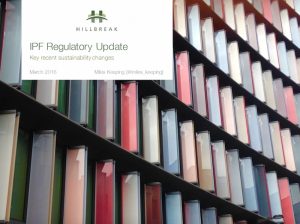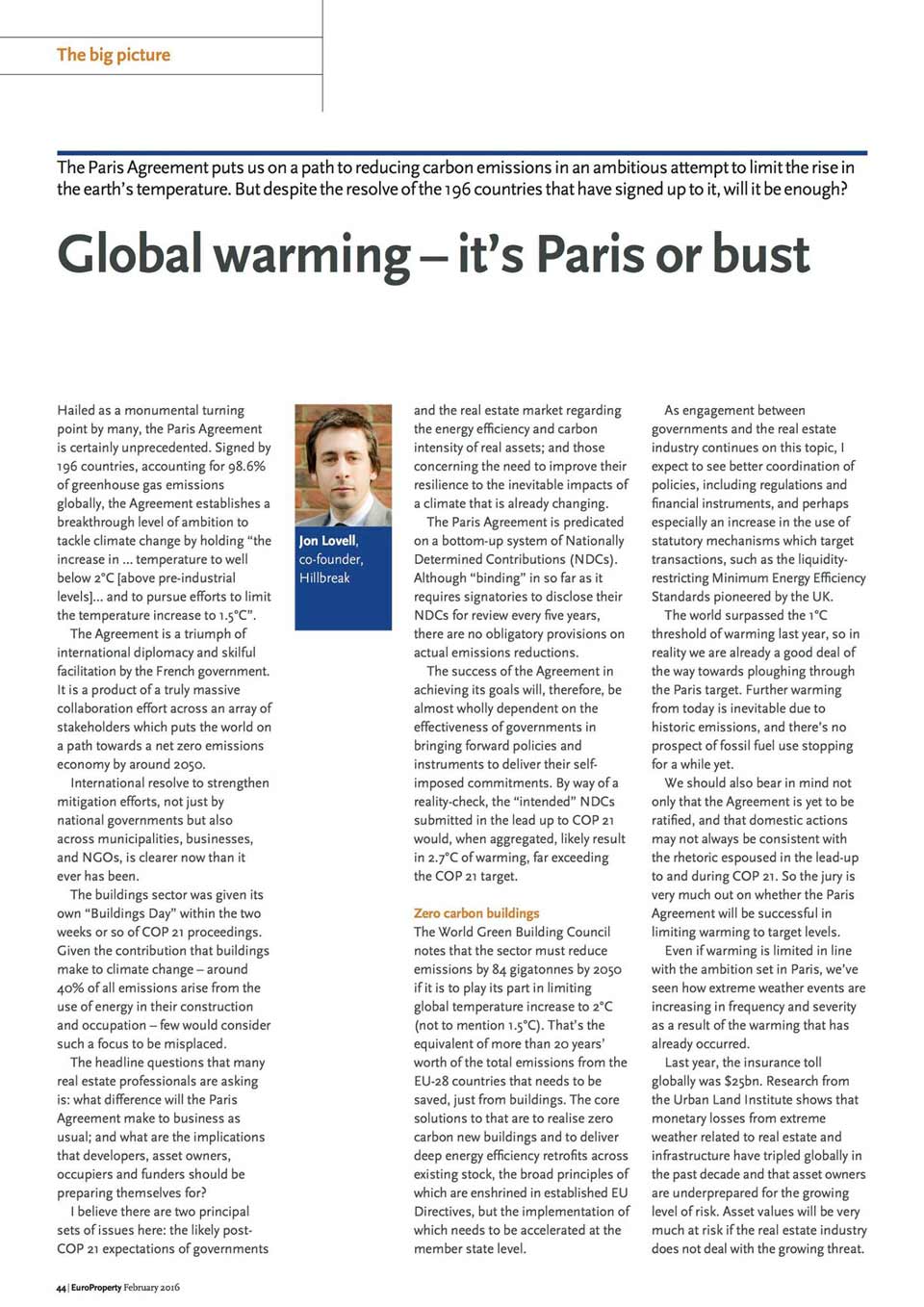The trouble with Science Based Targets
Background
Formally-approved Science Based Targets (SBTs) are a scheme of the Science Based Targets Initiative (SBTi), a venture of the UN Global Compact, CDP, World Resources Institute and WWF. They have been gaining much attention and some traction amongst corporates and institutional investors; at the time of writing, 105 companies have in place targets formally approved by the SBTi.
In essence, these are targets adopted by companies to reduce emissions proportionately in line with the level of decarbonisation required to meet the <2oC global warming goal of the Paris Agreement on Climate Change.
Certainly, SBTs have useful application at a macro or portfolio level. For example, they can be a tool for policy-makers to establish future carbon budgets and related policy instruments for individual economic sectors, or they can assist investors in setting climate mitigation goals across their respective investment universes. However, a principal benefit often cited of SBTs is that they provide evidence-based pathways against which to pin the carbon reduction strategies of individual entities, including within sector-specific contexts. This, we challenge.
Whilst SBTs have their place, including a welcome shift in thinking towards corporate climate action being proportional to associated global impacts, we question their role and utility at the individual entity level in the absence of sector-wide agreements to meet the necessary pathways.
Indeed, rather than being a force for rapid progress on the urgent need to mitigate climate change, they may actually have an unintended and dangerous dampening effect on the rate and extent to which individual companies – and sectors – achieve their full carbon reduction potential.
Of the various methodologies recognised by the SBTi, the Sectoral Decarbonisation Approach (SDA) is the most applicable to real estate organisations, with a normalisation approach based on floor area and a carbon intensity pathway of 55 percent by 2050 from a 2010 baseline.
Driven by perceived or directly expressed investor requirements, a number of real estate organisations have established formal SBTs to demonstrate their commitment to the <2oC goal of the Paris Agreement. They have, understandably, received plaudits and achieved enhanced brand profile for taking an early stance in line with their market leadership on responsible property investment.
A race to the bottom
Aside from certain methodological limitations (including, in particular, on the question of how best to deal with Scope 3 emissions in a real estate context), we have a more fundamental concern with SBT-compliance being assumed by the industry as a badge of leadership for responsible investment when the SDA pathways represent the average level of decarbonisation needed of individual sectors. If organisations at the front of the ESG agenda are adopting targets based on the global sector average, the chances of those sector pathways being realised – and the goals of the Paris Agreement as a consequence – become very remote indeed.
There will be many real estate organisations with portfolios centred on advanced jurisdictions, such as the UK, where very little or no real action will be required of them, either because the continued decarbonisation of the grid will essentially do the job of achieving SBT-compliant trajectories for them, or arrangements can be made to purchase 100% of electricity from renewable sources at rates competitive with brown electricity. Worse than that, the efficiency of portfolios could actually regress, and an SBT could still be realised. There may also be unintended consequences relating to technology selection.
A problem amplified
In addition to specific investor requirements, the rationale for establishing SBTs at a house or entity level has been amplified by their positive recognition in the latest assessment framework of the Global Real Estate Sustainability Benchmark (GRESB), the most widely utilised portfolio-level barometer of attendance to ESG issues for the industry. By attaching ‘points’ to compliance, GRESB participants will have an added incentive to pursue formal SBT accreditation. Recognition is similar in the latest edition of the CDP Climate Change Module.
It means that schemes such as GRESB and CDP will be of limited effectiveness in driving the necessary sector-wide performance because they will be rewarding participants for setting out to achieve what should be considered a floor-level trajectory. In those cases where entities can rely entirely on grid decarbonisation in the jurisdictions in which they operate, this amounts to nothing more than recognising and rewarding an administrative process, albeit one that has involved a good deal of technical work undertaken in good faith by those wishing to demonstrate leadership. Perhaps this does warrant some time-limited credit, but the impact of true portfolio performance indicators on industry benchmark positions will be diluted in the meantime.
A better approach for investors
Investors that recognise the risks of climate change to capital market stability and investment performance, are, quite rightly, motivated to use their engagement activities with investee funds and companies as a means of positive influence to help drive decarbonisation. Requiring or encouraging the adoption of SBTs by those entities in which they are invested is, therefore, a seemingly obvious responsible investment tool. Interestingly, their widespread application across the asset classes may actually help to reinforce the merits of increasing capital allocations to real estate as part of comprehensive portfolio decarbonisation strategies.
However, we contend that, especially in mature markets, investors should not treat SBT compliance by individual entities as a marque of responsibility. Instead, they could aim to move towards science-based targets being a ‘lowest common denominator’ indicator for their allocations, complemented by stipulating clearer requirements on real estate companies and funds to demonstrate how, and by when, they will achieve (net) zero carbon status.
Towards net zero
In the meantime, and depending on case-by-case circumstances, we will continue to recommend and support our real estate clients’ efforts to pursue SBT compliance because of the increasingly clear demands for them to do so by investors and analysts. We will do this, however, with full acknowledgement of the limitations of the SBT approach, and will typically be encouraging greater emphasis on total decarbonisation pathways as part of a positive investor engagement and climate risk management journey.
This article was authored jointly by Jon Lovell, Co-Founder & Director of Hillbreak, and Dave Worthington, Managing Director of Verco.

















